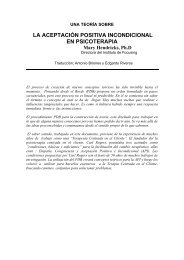8 Focusing en de experiëntiële aspecten van psychotherapie
8 Focusing en de experiëntiële aspecten van psychotherapie
8 Focusing en de experiëntiële aspecten van psychotherapie
You also want an ePaper? Increase the reach of your titles
YUMPU automatically turns print PDFs into web optimized ePapers that Google loves.
608 Literatuur<br />
Hamelinck, L., & <strong>van</strong> Aud<strong>en</strong>hove, C. (1991). Intake <strong>en</strong> indicatiestelling. In H. Swild<strong>en</strong>s, O. <strong>de</strong> Haas, G.<br />
Lietaer & R. Van Bal<strong>en</strong> (Red.), Leerboek Gesprekstherapie. De cliëntgerichte b<strong>en</strong>a<strong>de</strong>ring (pp. 269-303).<br />
Leuv<strong>en</strong>/Amersfoort: Acco.<br />
Hanson, J. (2005). Should your lips be zipped? How therapist self-disclosure and non-disclosure affects<br />
cli<strong>en</strong>ts. Counselling and Psychotherapy Research, 5, 96-104.<br />
Harman, J.I. (1990). Unconditional confid<strong>en</strong>ce as a facilitative precondition. In G. Lietaer, J. Rombauts,<br />
& R. Van Bal<strong>en</strong> (Red.), Cli<strong>en</strong>t-c<strong>en</strong>tered and experi<strong>en</strong>tial psychotherapy in the nineties (pp. 251-268).<br />
Leuv<strong>en</strong>: Universitaire Pers Leuv<strong>en</strong>.<br />
Hart, O. <strong>van</strong> <strong>de</strong>r (Red.). (1987). Afscheid nem<strong>en</strong>: afscheidsrituel<strong>en</strong> in <strong>de</strong> <strong>psychotherapie</strong>. Lisse: Swets &<br />
Zeitlinger.<br />
Hart, O. <strong>van</strong> <strong>de</strong>r (Red.). (1992). Trauma, dissociatie <strong>en</strong> hypnose (2<strong>de</strong> druk). Lisse: Swets & Zeitlinger.<br />
Haugh, S, & Merry, T. (Red.). (2001). Rogers’ therapeutic conditions: Evolution, theory and practice. Part 2.<br />
Empathy. Ross-on-Wye, UK: PCCS Books.<br />
Haugh, S. (1998). Congru<strong>en</strong>ce: A confusion of language. Person-C<strong>en</strong>tred Practice, 6(1), 44-50.<br />
Hayes, A.M., Strosahl, K., & Wilson, K. (2006). ACT. E<strong>en</strong> <strong>experiëntiële</strong> weg naar gedragsveran<strong>de</strong>ring.<br />
Amsterdam: Harcourt..<br />
Hazan, C., & Shaver, P.. (1987). Conceptualizing romantic love as an attachm<strong>en</strong>t process. Journal of<br />
Personality and Social Psychology, 52, 511 – 524.<br />
Heeker<strong>en</strong>s, H.-P. (2002). Wirksamkeit <strong>de</strong>r personz<strong>en</strong>triert<strong>en</strong> Kin<strong>de</strong>r- und Jug<strong>en</strong>dlich<strong>en</strong><strong>psychotherapie</strong>.<br />
In C. Boeck-Singelmann, B. Ehlers, T. H<strong>en</strong>sel, S. Jürg<strong>en</strong>s-Jahnert, & C. Mond<strong>en</strong>-Engelhardt (Red.),<br />
Personz<strong>en</strong>trierte Psychotherapie mit Kin<strong>de</strong>rn und Jug<strong>en</strong>dlich<strong>en</strong>. Band. 1. Grundlag<strong>en</strong> und Konzepte<br />
(2nd ed.; pp. 195-207). Götting<strong>en</strong>: Hogrefe.<br />
Hei<strong>de</strong>gger, M. (1998). Zijn <strong>en</strong> tijd. Nijmeg<strong>en</strong>: SUN/Leuv<strong>en</strong>: Kritak.<br />
Hei<strong>de</strong>gger, M. (2001). Zollikon seminars: Protocols – conversations - letters. London: Routledge.<br />
Heintz, F. (1997). Teaching focusing to childr<strong>en</strong> 10-14 years old. The Folio. A Journal for <strong>Focusing</strong> and<br />
Experi<strong>en</strong>tial Therapy, 16(1-2), 55-56.<br />
Hell<strong>en</strong>doorn, J. (1999). Beeldcommunicatie: kin<strong>de</strong>r<strong>psychotherapie</strong> op f<strong>en</strong>om<strong>en</strong>ologische grondslag.<br />
Tijdschrift Cliëntgerichte Psychotherapie, 37, 172-186.<br />
Hell<strong>en</strong>doorn, J., Groothoff, E., & Mostert, P. (1992). Beeldcommunicatie, e<strong>en</strong> vorm <strong>van</strong> kin<strong>de</strong>r<strong>psychotherapie</strong>.<br />
Hout<strong>en</strong>: Bohn Stafleu Van Loghum.<br />
Hellinga, G., Luyn, <strong>van</strong> B., & Dalewijk, H.J. (Red.). (2000). Personalities. Master clinicians confront the<br />
treatm<strong>en</strong>t of bor<strong>de</strong>rline personality disor<strong>de</strong>r. Amsterdam: Boom.<br />
Hellinger, B. (2002). De verborg<strong>en</strong> dynamiek <strong>van</strong> familieband<strong>en</strong>. Bloem<strong>en</strong>daal: Altamira-Becht.<br />
Helsk<strong>en</strong>s, D., Dill<strong>en</strong>, L., Siongers, M., & Verhofstadt-D<strong>en</strong>ève, L. (2007). Psychodrama binn<strong>en</strong> ontwikkelingsgerichte<br />
kin<strong>de</strong>r<strong>psychotherapie</strong>. Theoretische fun<strong>de</strong>ring <strong>en</strong> praktische toepassing. Tijdschrift<br />
voor Orthopedagogiek, Kin<strong>de</strong>rpsychiatrie <strong>en</strong> Klinische Kin<strong>de</strong>rpsychologie, 23, 97-126.<br />
H<strong>en</strong>dricks, M. (1984). A focusing group. Small Group Behaviour, 15, 155-171.<br />
H<strong>en</strong>dricks, M. (1986/1987). Experi<strong>en</strong>cing level as a therapeutic variable. Person-c<strong>en</strong>tered Review, 1, 141-<br />
162. (Ned. vertaling: Psychotherapeutisch Paspoort, 1987, pp. 5.21-45).<br />
H<strong>en</strong>dricks, M. (2001). An experi<strong>en</strong>tial version of unconditional positive regard. In J. D. Bozarth & P.<br />
Wilkins (Red.), Rogers’ therapeutic conditions: Evolution, theory and practice. Volume 3. Unconditional<br />
positive regard (pp. 126-144). Ross-on-Wye, UK: PCCS Books.<br />
H<strong>en</strong>dricks, M. (2002). <strong>Focusing</strong>-ori<strong>en</strong>ted/Experi<strong>en</strong>tial Psychotherapy. In D. Cain & J. Seeman (Red.),<br />
Humanistic <strong>psychotherapie</strong>s: Handbook of research and practice (pp. 221-251). Washington, D.C.:<br />
Amercan Psychological Association.










